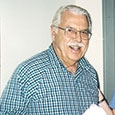William J. Hebert
(1923-2017)
.jpg)
William Hebert’s musical studies began at age 8 as therapy for his lungs after he contracted tuberculosis at age 2. He started on the fife, and his brother played the drums, so they had a household fife and drum corps. Lessons were 50¢ per week, and at end of the summer, the fife teacher suggested a switch to flute. Flute lessons were $1, a large expenditure for the family since their weekly income was $16 per week. Hebert commented, “It could have been any instrument: contrabassoon, trombone. Any wind instrument would have helped my lungs get stronger. Little did we know playing the flute would end up becoming my profession.”
Later the family moved to Cambridge, Massachusetts where Hebert studied with the Boston Symphony flutist James Pappoutsakis who also arranged for him to play in a training orchestra.
He was stationed in the South Pacific during World War II with the U.S. Army Band, and his duties included carrying ammunition and being a stretcher bearer as well as performing in the ceremonial events and public concerts.
After his discharge he attended the Juilliard School where he studied with Arthur Lora, principal flutist of the Metropolitan Opera Orchestra and the NBC Symphony. George Szell selected Hebert to join the Cleveland Orchestra as the piccolo player in 1947. He held this position for the next 41 years, playing under the batons of Szell, Lorin Maazel, Christoph von Dohnányi, and Franz Welser-Möst as well as many guest conductors including Pierre Boulez. In addition, he taught at Kent State University, the Cleveland Institute of Music, and at his longest teaching position, the Baldwin-Wallace Con-servatory, from 1950-1995.
A well-respected teacher, many of his students are teachers and performers around the world. When asked whether he enjoyed teaching, Hebert responded with enthusiasm. “I thrive on it. I enjoy working with people who are serious and willing to work. I am basically a problem solver and have always been intrigued with why things happen. In teaching I have to come up with different explanations and solutions for different people. I enjoy a student who is serious, intelligent and has at least a modicum of talent, and lots of problems to solve. Intelligence is important: I have to be able to appeal to a student’s intellect in order for change to occur.”
He was known for the caring approach he took with his students. Mary Kay Robinson remembers, “he taught the whole student, from the inside out. He cared about his students as individuals, each one unique and full of potential. Lessons often included, ‘let’s take a break. How about a glass of water? Let’s talk for a few minutes.’” She also comments, “He was very diagnostic and could spot a problem with the instrument or the performer and resolve it in short order.”
Hebert was an extraordinary teacher and performer and received the N.F.A. Lifetime Achievement Award in 2000. He passed away at the age of 94.
For more about Hebert’s life and his teaching, two articles from the Flute Talk archives:
Dedication and Artistry, An Interview with William Hebert by Cynthia Ellis (May/June 2012)
William Hebert: Playing Piccolo with Pride by Karen Yonovitz and Susan Waller (February 1988) – to come





